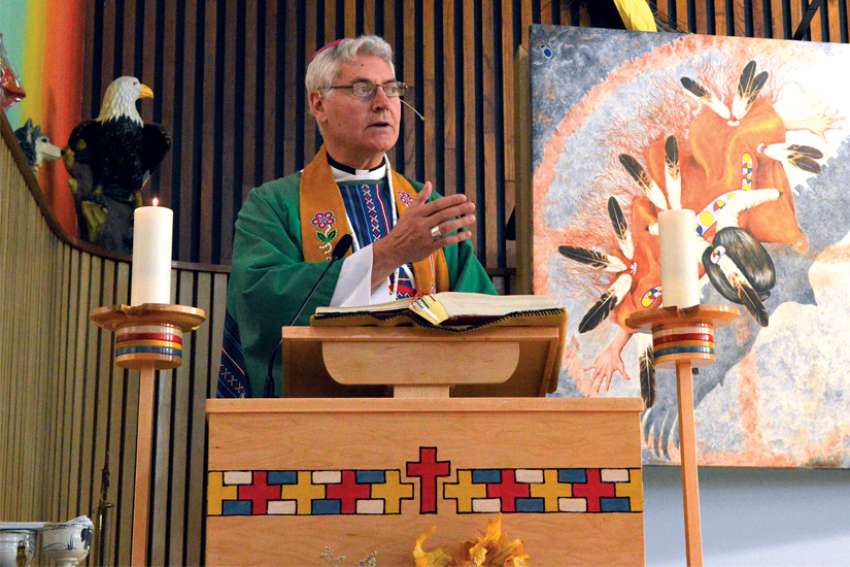Subjects discussed at the Synod of Bishops for the Amazon are similar to what Chatlain faces in Keewatin-Le Pas, what Gordon faces on Vancouver Island in the Diocese of Victoria and what other dioceses face across the vast Canadian north. The areas are remote, largely populated by Indigenous peoples, have too few priests and their lands are rich in natural resources coveted by corporations.
Chatlain said the attention brought to the Amazon can only help conversations when the first world meets with the Indigenous peoples who have called these lands home since before the Europeans arrived.
“I think it’s a validation of Indigenous peoples across the world, that there are gifts and cultural values that are to be respected and listened to,” said Chatlain, archbishop of Keewatin-Le Pas, which covers a vast swath of land across northern Saskatchewan and Manitoba into northwestern Ontario. “I think that’s a good model for us to continue to work on in Canada. The Indigenous peoples of Canada have a very significant role and voice that we as Church continue to be able to hear.”
Gordon said the synod provided “a listening stance to the Indigenous populations in those regions.”
An issue long on the table in Canada has been the discussion of married priests in the North, though the northern bishops have not been pushing as strongly as they did in the late 20th century. The issue drew plenty of attention at the synod and synod fathers called for approval of ordaining married priests to serve remote Amazon regions, as well as giving women leadership roles in the Church. Whether Pope Francis approves changes remains unclear.
Gordon said “it just doesn’t cut it” in “radically rural territory” for a priest to be flying in for Mass once a year. The synod kickstarted the conversation needed for serving these territories and the Church needs to be “a little more creative” in how this works.
“If the celebration of the Eucharist is the source and summit, we may have to think of other ways that it might be able to happen without a 10-year seminary program,” said Gordon, who served nine years as bishop of Whitehorse in the Yukon and northern B.C.
Chatlain said his diocese is trying to address things “from a variety of perspectives.”
“We’re open to the Holy Spirit’s direction if a married clergy is a way forward. We’re praying for vocations (and) we’re also working on the permanent diaconate,” he said. “That was fairly strong a few years back and now we’re starting to resurface the development of permanent diaconate, especially from some of our Indigenous men.”
Chatlain said they’ve had “a gift” in the number of foreign priests who serve in Canada’s north. The key, though, is developing local leaders. “Our real goal is our lay leaders. We have worked hard over many years to call forth our local lay leaders, and most of them are grandmas,” he said.
The Whitehorse diocese has recently begun to seek new vocations from outside the diocese. It has only a handful of active priests and religious brothers and sisters serving 7,500 Catholics spread over 23 parishes and missions in a 725,000 square-kilometre area. The plan is to have these candidates study at one of the three Redemptoris Mater Seminaries in Canada (Toronto, Vancouver and Quebec City).
In the aftermath of the synod, it’s time to act on a host of issues, but it won’t be easy or quick, said Chatlain. “Trying to have reconciliation, to try to have a deeper understanding between groups, it’s not simple work or we would have done it a long time ago,” he said.
There’s no one solution and the bishops have been observing the efforts of the Anglicans in the North, and “they’re not hitting the ball out of the park,” said Chatlain. Their struggles are similar to those of the Catholic Church.
“I think the Amazonian reality may lend itself to something more creative because of the radical isolation,” said Gordon.


